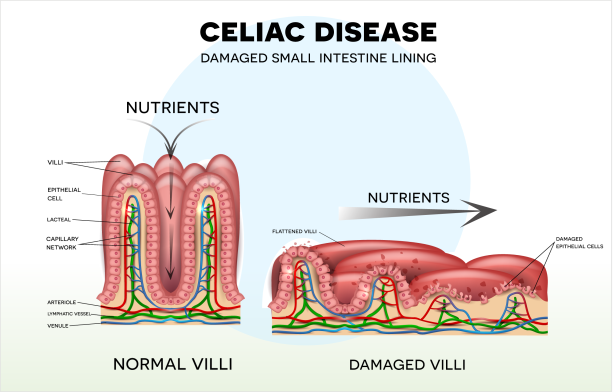Celiac Disease
An immune reaction to eating gluten, a protein found in wheat, barley, and rye. Over time, the immune reaction to eating gluten creates inflammation that damages the small intestine’s lining, leading to medical complications. It also prevents absorption of some nutrients (malabsorption). The classic symptom is diarrhea. Other symptoms include bloating, gas, fatigue, low blood count (anemia), and osteoporosis. Many people have no symptoms. The mainstay of treatment is a strict gluten-free diet that can help manage symptoms and promote intestinal healing.
FAQ
What are the common symptoms of Celiac Disease?
Symptoms can vary widely, but common ones include gastrointestinal issues like diarrhea, abdominal pain, and bloating. Other symptoms may include fatigue, weight loss, anemia, joint pain, and skin rashes. Some individuals may not exhibit noticeable symptoms.
How is Celiac Disease diagnosed?
Diagnosis involves blood tests to check for specific antibodies and genetic testing. A definitive diagnosis often requires an intestinal biopsy to assess the damage to the small intestine lining. It’s crucial to continue eating gluten-containing foods before testing for accurate results.
Is Celiac Disease hereditary?
Yes, Celiac Disease has a strong genetic component. Individuals with a first-degree relative (parent, sibling, or child) with Celiac Disease have an increased risk of developing the condition. Genetic testing can help identify individuals at risk.
What foods contain gluten?
Gluten is found in wheat, barley, rye, and their derivatives. Common foods containing gluten include bread, pasta, cereals, baked goods, and many processed foods. It’s important for those with Celiac Disease to read food labels carefully.
How is Celiac Disease treated?
The primary treatment for Celiac Disease is a strict, lifelong gluten-free diet. This involves avoiding all sources of gluten. Nutritional supplements may be recommended initially to address nutrient deficiencies. In some cases, medications may be prescribed to manage symptoms or complications.
Can Celiac Disease lead to other health complications?
Yes, untreated Celiac Disease can lead to various complications, including malnutrition, osteoporosis, infertility, neurological issues, and an increased risk of certain cancers. Adhering to a gluten-free diet helps prevent these complications.
Can Celiac Disease develop at any age?
While Celiac Disease often manifests in childhood, it can develop at any age. Some individuals may not experience symptoms until adulthood. The triggers for the onset of symptoms can include stress, surgery, pregnancy, or other environmental factors.
Is there a cure for Celiac Disease?
Currently, there is no cure for Celiac Disease. The only effective treatment is maintaining a strict gluten-free diet. Research is ongoing, exploring potential therapies, but as of now, adherence to a gluten-free lifestyle is essential.
Can someone with Celiac Disease ever reintroduce gluten into their diet?
No, individuals with Celiac Disease should strictly avoid gluten for life. Even small amounts of gluten can trigger an immune response and damage the small intestine. Reintroducing gluten is not recommended and can lead to a recurrence of symptoms and complications.


